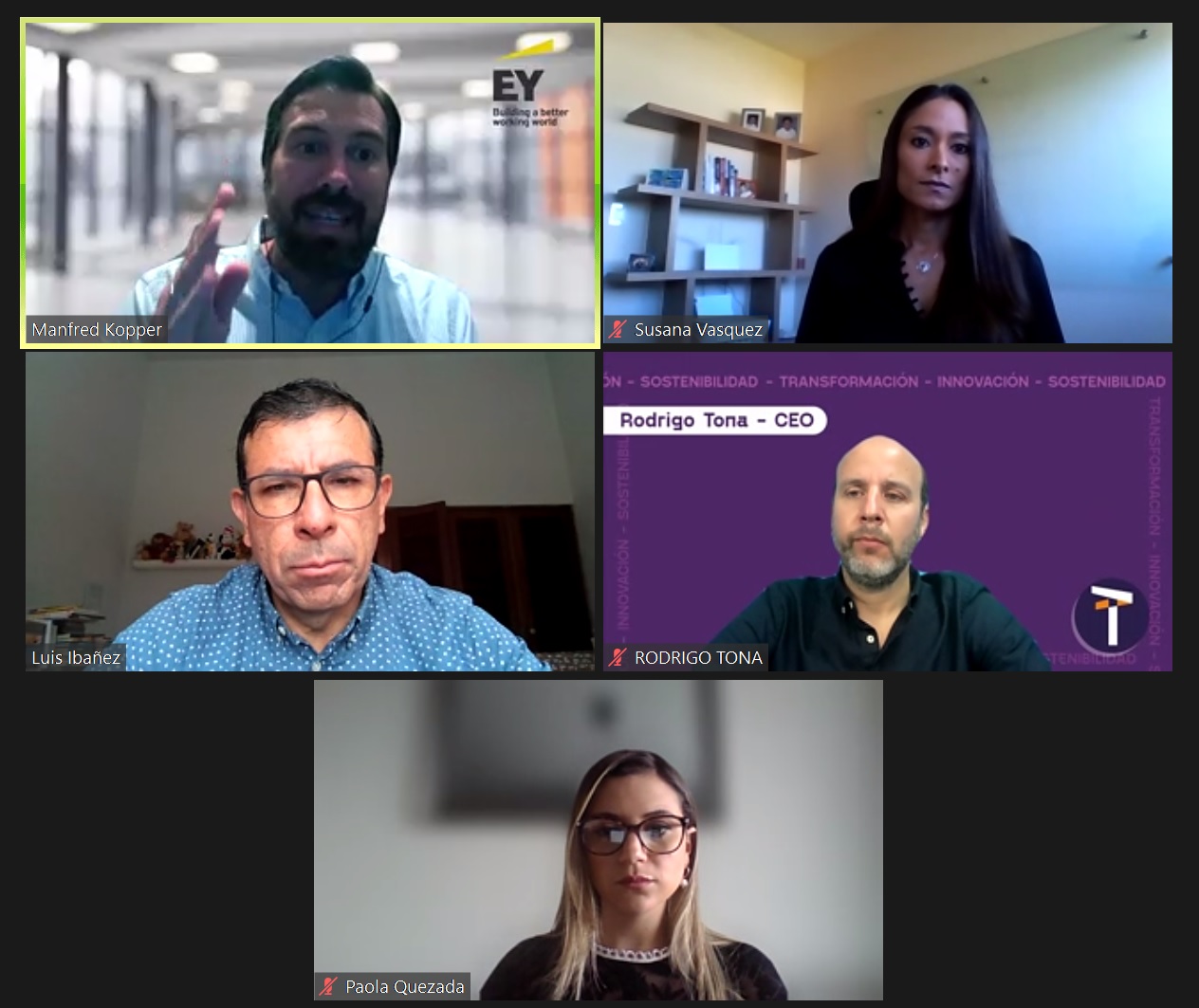At the beginning, Robert Vinelli, current president of FECAICA, emphasized that: "we are pleased because our discussion today is made up of professional experts on the subject and how they have successfully managed to implement sustainability actions so that they can be a reference for small, medium and large companies".
He said that it is essential that there is a balance between the economic growth of companies and the use they make of their human, financial, material and natural resources. "Creating profitable and sustainable companies are key to reducing even migration from our countries", he said.

The colloquium was moderated by Paola Quezada, Executive director of FECAICA, who said that "consumers and society in general place great value on companies and sectors, regardless of their size, that contribute to society. This is positive, because they are important indications that present and future generations will generate value in making their decisions as consumers, motivating the business sector to contribute to society, the environment and responsible economic development".
More and more companies are adding sustainable strategies as a central part of their business, guided to a large extent by the Sustainable Development Goals (SDGs) of the United Nations to set their own actions. When reviewing the characteristics of these goals, it can be seen that sustainability encompasses a large number of issues that go beyond environmental care. Of the 17 goals, we can mention: peace, justice and strong institutions; affordable and clean energy; sustainable cities and communities; industry, health, life of terrestrial ecosystems and innovation and infrastructure, which are key drivers of economic growth and development, among others.
With an impact on society
Manfred Kopper, Senior Manager of Sustainability Services for CA and DR at Ernst & Young, stated that "as rigorously as we measure economic performance, we must measure social, environmental and corporate governance performance". There is clear evidence that investors, corporate clients, employees and consumers care about and value the impact that companies are having on society. In a study conducted by E&Y to 500 companies, they concluded that 87% have stated that success is in their consumers and employees, both make their decisions to work or purchase products based on the impact they generate in social or environmental issues.

"Sustainability is not optional. Companies and leaders are responsible for building a sustainable future for all," said Rodrigo Tona, CEO of Ternova Group. He adds that, in the world, human beings are the ones who demand consumption the most, so "we ask for a balance between consumption and development." As a company, he says that 10 years ago "we rethought where the plastics industry is going and reinvented ourselves. Sustainability and business do not compete, they complement each other, it is our axis, with social, environmental and economic impact".
"Sustainable companies are undoubtedly the most prepared to face challenges", said Susana Vásquez, Director of External Affairs for Central America at Phillip Morris International. She said that sustainability must be seen as an investment and not an expense, in order to remain in time. She commented that Philip Morris is in a process of total transformation, which includes sustainability, the adult consumer and society in general as cross-cutting pillars. The company's goal is that in the next 10 to 15 years, in several markets, it will stop selling conventional cigarettes and adult smokers who want to continue smoking will have science-based, smokeless and lower risk alternatives, compared to the traditional cigarette.
"We are transforming ourselves into a technology and innovation company, seeking a future without cigarettes, including with products that go beyond nicotine, with investments in major pharmaceutical companies such as Vectura, Fertin Pharma and OtiTopic, in addition to our goals of achieving carbon neutrality in our operations and our value chain, among others", she said.
Luis Ibáñez, CEO of Licores de Guatemala, said: "a company that does not transform itself and incorporate sustainability cannot compete in foreign markets. In the case of Licores de Guatemala, he said that the integrated chain has enabled them to include sustainability throughout the value chain. "The environmental sustainability pillar is extremely important for the corporation, where we have a large number of certifications to compete abroad. We also have a social pillar focused on community support schemes through our foundations, in addition to a healthy work environment. A company cannot grow and develop if it does not include environmental and social sustainability in its business model", he concluded.
"Sustainability should be seen as more than preventing risks, they are opportunities to be able to offer new alternatives to more conscious consumers", stated Manfred Kopper Castro.
The impact of COVID 19
The discussion also addressed the issue of COVID-19 and the impact it has had on companies.
The speakers explained that they have generated challenges to reinvent themselves. For example, Rodrigo Tona commented that three industries that participated in the colloquium, have not been transformed by the pandemic, but have had processes since years ago, and are an example of their ability to reinvent themselves, not only during COVID-19 but post COVID-19. "This is the only way to generate important results to face this new world and build a new way of doing business", he said.
Susana Vásquez said that, despite the context of the pandemic, progress has been made in the transformation in a sustainable way to diversify the portfolio of Phillip Morris, so that "in 2025 we will be positioned in 100 markets where smoke-free products are available to adult smokers who will continue to smoke". Regarding the generation of employment in the context of the pandemic, Susana Vásquez emphasized that: "Philip Morris made a commitment not to reduce or lay off any of its employees. It was a great responsibility for the company, but at the same time a very important one, being a social and responsible contribution in the midst of what we are going through".
Before concluding the talk, Paola Quezada, Executive director for FECAICA, said that sustainability is undoubtedly a broad topic that must be approached from different points of view. What is clear is that more and more companies are joining this trend in response to consumer needs, regulation and incursion into other markets. Those who are excluded from this narrative will be affected by various issues such as reputation, competitiveness and even their own continuity.
 English
English  Español
Español 
